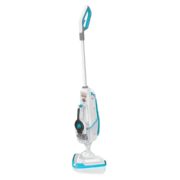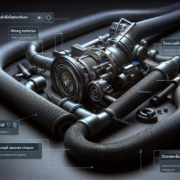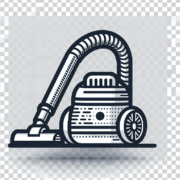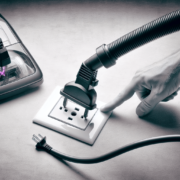If you’re tired of the loud and disruptive noise that fills your home every time you clean, then it’s time to take a closer look at the impact of noise levels when it comes to vacuum cleaners. We all want a clean living space, but why should it come at the cost of peace and quiet? In this article, we will explore the connection between vacuum cleaners and noise levels, and discuss the benefits and importance of choosing a vacuum cleaner that operates quietly. Say goodbye to the days of needing earplugs just to clean your carpets, as we uncover the latest advancements in silent cleaning technology.
Factors Influencing Noise Levels
Motor Power
The power of the motor in a vacuum cleaner is one of the key factors that can affect its noise levels. Generally, vacuum cleaners with higher motor power tend to produce more noise. This is because a more powerful motor requires more energy to operate, which in turn leads to louder noise. On the other hand, vacuum cleaners with lower motor power tend to be quieter. When purchasing a vacuum cleaner, it’s important to consider your cleaning needs, as well as the desired noise level.
Design and Construction
The design and construction of a vacuum cleaner play a significant role in determining its noise levels. Vacuum cleaners with poor design and construction may produce more noise due to factors such as air leakage or insufficient insulation. On the contrary, vacuum cleaners that are well-designed and properly constructed can help reduce noise levels. Look for vacuum cleaners that have features such as soundproofing materials, insulating layers, and vibration dampening technologies to help minimize noise.
Type of Vacuum Cleaner
Different types of vacuum cleaners tend to have varying noise levels. For instance, traditional upright vacuum cleaners often produce more noise compared to canister or stick vacuum cleaners. This is because upright vacuum cleaners typically have powerful motors that generate more noise. Additionally, bagless vacuum cleaners may produce more noise compared to those with bags, as the lack of a bag can lead to increased airflow noise. It’s important to consider the noise levels of different vacuum cleaner types before making a purchase.
Accessories and Attachments
The accessories and attachments that come with a vacuum cleaner can also influence its noise levels. For example, vacuum cleaners with motorized brush rolls or beater bars may produce more noise when in use. Similarly, attachments such as turbo brushes or power nozzles can increase the noise levels of a vacuum cleaner. When choosing a vacuum cleaner, consider whether you really need these accessories or if you can opt for quieter alternatives.
Decibel Range and Perception
Understanding Decibels
Decibels (dB) are the unit of measurement used to quantify sound levels. The decibel scale is logarithmic, meaning that every increase of 10 dB represents a tenfold increase in sound intensity. As a reference, a whisper is typically around 30 dB, while a noisy urban street can exceed 80 dB. When it comes to vacuum cleaners, the decibel ranges can vary from around 60 dB for quiet models to over 80 dB for more powerful and noisy ones.
Subjective Perception
It’s important to keep in mind that the perception of noise levels can vary from person to person. What may seem quiet to one individual might be considered loud by another. Factors such as individual sensitivity to noise, personal preferences, and previous exposure to loud sounds can all influence how one perceives the noise emitted by a vacuum cleaner. It’s advisable to consider your own tolerance for noise and choose a vacuum cleaner that suits your preferences.
Regulations and Standards
Occupational Noise Exposure
In certain occupations, such as janitorial or custodial work, exposure to high levels of noise from vacuum cleaners can be a concern. To protect workers from potential hearing damage, occupational safety and health organizations have established guidelines and regulations regarding acceptable noise exposure levels. Employers are often required to provide hearing protection to workers and ensure that noise levels in the workplace comply with these regulations.
Residential Limits
In residential settings, there are often no specific regulations or legal limits regarding vacuum cleaner noise levels. However, noise pollution can still be a concern, especially in multi-unit buildings or neighborhoods with strict noise regulations. Being considerate of your neighbors and choosing a quieter vacuum cleaner can help maintain a peaceful living environment.
Labeling Requirements
In some countries, manufacturers are required to label their vacuum cleaners with noise level information. This allows consumers to make informed decisions when purchasing a vacuum cleaner based on its noise output. Pay attention to these labels and look for vacuum cleaners that have been tested and certified to meet certain noise standards.
Impact on Health and Well-being
Hearing Damage and Tinnitus
Exposure to high levels of noise from vacuum cleaners can potentially lead to hearing damage and tinnitus. Prolonged exposure to loud noise can cause permanent damage to the delicate structures of the inner ear. This can result in hearing loss and a constant ringing or buzzing sensation in the ears, known as tinnitus. By choosing a vacuum cleaner with lower noise levels, you can reduce the risk of long-term hearing damage and tinnitus.
Stress and Sleep Disturbances
Excessive noise from vacuum cleaners can also contribute to stress and sleep disturbances. Constant exposure to loud noise can trigger the body’s stress response, leading to elevated cortisol levels and increased feelings of anxiety and tension. Additionally, loud noise during quiet hours can disrupt sleep, making it difficult to fall asleep or stay asleep throughout the night. Opting for a quieter vacuum cleaner can help create a more peaceful and relaxing environment in your home.
Noise Reduction Measures
Soundproofing Materials
Vacuum cleaner manufacturers are increasingly incorporating soundproofing materials into their products to help reduce noise levels. These materials, such as foam padding or rubber insulation, can effectively absorb and dampen vibrations and reduce the transmission of sound waves. Look for vacuum cleaners that have soundproofing features to enjoy a quieter cleaning experience.
Silencers and Mufflers
Some vacuum cleaner models come equipped with built-in silencers or mufflers. These devices are designed to reduce noise levels by efficiently dissipating and redirecting airflow noise. By diverting the sound waves and reducing turbulence, silencers and mufflers can significantly decrease the overall noise produced by the vacuum cleaner. Consider models that include these noise reduction features for a quieter cleaning experience.
Manufacturer’s Efforts
In response to growing concerns about noise levels, many vacuum cleaner manufacturers have been actively working to develop quieter models. They invest in research and development to improve the design and construction of their products, aiming to reduce noise generation while maintaining cleaning performance. Keep an eye out for vacuum cleaner brands that prioritize noise reduction and provide quieter options for consumers.
Tips for Choosing a Quieter Vacuum Cleaner
Check Decibel Ratings
When comparing vacuum cleaners, it’s essential to check their decibel ratings. This allows you to identify models that produce lower noise levels. Look for vacuum cleaners with decibel ratings around 60 dB or lower, as these are generally considered to be quieter. However, it’s important to remember that noise perception is subjective, so it may be beneficial to try to test the vacuum cleaner or read customer reviews before making a final decision.
Consider Different Types
As mentioned earlier, different types of vacuum cleaners tend to have varying noise levels. If noise reduction is a priority for you, consider alternative types such as canister or stick vacuum cleaners. These models often produce less noise compared to traditional upright vacuum cleaners. Exploring different types of vacuum cleaners can help you find a quieter option that suits your cleaning needs.
Try Before You Buy
Whenever possible, try physically using or testing a vacuum cleaner before making a purchase. This allows you to experience the noise level firsthand and determine if it’s acceptable to you. Visit home appliance stores or ask friends and family if you can try out their vacuum cleaners. By testing different models, you can make a more informed decision and choose a quieter vacuum cleaner that meets your requirements.
Read Customer Reviews
Customer reviews can provide valuable insights into the noise levels of various vacuum cleaners. Take the time to read reviews from other users who have purchased and used the models you are considering. Look for feedback specifically related to noise levels and pay attention to any recurring themes or concerns. This can help you gauge the overall noise performance of a particular vacuum cleaner and make an informed decision.
Maintenance and Cleaning Practices
Regular Filter Replacement
Regular maintenance and cleaning of your vacuum cleaner can help ensure optimal performance and reduce noise levels. One essential maintenance task is replacing the filters as recommended by the manufacturer. Clogged or dirty filters can impact the airflow and ventilation of the vacuum cleaner, leading to increased noise levels. By regularly replacing the filters, you can ensure proper airflow and minimize noise.
Cleaning Brush Rolls and Belts
Dirt, hair, and debris can accumulate on brush rolls and belts, causing them to become less efficient and generate more noise. Regularly cleaning these components can help prevent debris buildup and maintain smooth operation. Follow the manufacturer’s instructions on how to clean and maintain the brush rolls and belts to keep your vacuum cleaner running quietly.
Lubricating Moving Parts
Lubricating the moving parts of your vacuum cleaner can contribute to reducing noise levels. Over time, these parts can become dry or worn, leading to increased friction and noise. By applying a thin layer of lubricant as recommended by the manufacturer, you can help reduce the noise generated by these moving parts. Make sure to use the appropriate lubricant specified in the user manual.
Noise Complaints and Solutions
Apartment Living
In apartment buildings or other shared living spaces, noise complaints from vacuum cleaners can be a common issue. To be considerate to your neighbors, it’s important to choose a quiet vacuum cleaner and be mindful of the time you use it. Avoid using your vacuum cleaner during early mornings, late nights, or other quiet hours specified by the building rules. Additionally, using a thick rug or carpet under your vacuum cleaner can help absorb noise and minimize disturbance to those living below you.
Residential Noise Pollution
Even in single-family homes, excessive noise from vacuum cleaners can be a source of annoyance and disruption. Opting for a quieter vacuum cleaner can help mitigate noise pollution within your household. Additionally, you can also consider using soundproofing methods in areas where the noise is most noticeable, such as placing acoustic panels or curtains on walls or windows near the cleaning area. These measures can help control and minimize noise propagation.
Using Vacuum at Appropriate Times
To minimize the impact of vacuum cleaner noise on your daily routine, plan your cleaning activities accordingly. Avoid using a vacuum cleaner during family gatherings, important phone calls, or when someone in your household is sleeping or studying. By using your vacuum cleaner at appropriate times, you can maintain a peaceful and harmonious living environment for everyone in your home.
Innovations in Quieter Vacuum Cleaners
Noise-Canceling Technology
Some vacuum cleaner manufacturers have started incorporating noise-canceling technology into their products. This technology uses built-in microphones and speakers to actively detect and counterbalance the noise generated by the vacuum cleaner. By producing sound waves that cancel out the undesirable noise, noise-canceling vacuum cleaners can effectively reduce overall noise levels. Look for models that feature this innovative technology for a quieter cleaning experience.
Brushless Motors
Traditional vacuum cleaners often rely on motors with brushes for the generation of suction power. However, these brushes can contribute to increased noise levels. Brushless motors, on the other hand, eliminate the need for brushes, resulting in quieter operation. Vacuum cleaners equipped with brushless motors tend to produce less noise while still providing ample suction power. Consider models with brushless motors for a quieter and efficient cleaning experience.
Improved Insulation
Vacuum cleaner manufacturers are continually working on improving the insulation of their products to reduce noise transmission. By incorporating advanced insulating materials and techniques, they are able to create vacuum cleaners that effectively contain noise within the machine. Improved insulation helps prevent sound waves from escaping and reaching the surrounding environment, resulting in quieter operation. Look for vacuum cleaners with enhanced insulation features for a more peaceful cleaning experience.
Future Trends and Expectations
Advancements in Noise Reduction
As technology continues to advance, it is expected that vacuum cleaner manufacturers will focus more on noise reduction. With increased demand for quieter appliances, we can anticipate that manufacturers will invest in research and development to develop innovative solutions for reducing noise levels in vacuum cleaners. This could involve the use of advanced noise-canceling technologies or the integration of quieter motor systems. The future looks promising for those seeking quieter cleaning experiences.
Balancing Noise Levels and Performance
While the goal of reducing noise levels in vacuum cleaners is essential, it is also crucial to strike a balance between noise reduction and performance. Vacuum cleaners need to effectively remove dirt and debris from various surfaces, and reducing noise should not compromise their cleaning capabilities. Future trends are likely to focus on achieving this delicate balance, ensuring that vacuum cleaners deliver optimal cleaning performance while operating at quieter levels.



